friendship
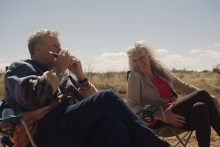
THE DAY AFTER I told my mother I was transitioning, I sat across from a childhood friend, who I’ll call Sarah, in Los Reyes, my favorite Mexican restaurant in my hometown. It was 2009, and I had come home from college specifically to give my mom the news. I hadn’t seen Sarah in six years but I remembered she had a strong faith that she shared openly and invitationally. As soon as I sat down, she asked how I was doing. Something in me broke open, yearning to be seen. I was a mess — sadness and anger dipping in and out of despair. I said something like, “My mom’s just never understood me, and now she’s not going to try to understand.” Sarah got quiet and nodded before replying, “So? I don’t understand either, but I’m here because I love you.”
Whatever I said in response doesn’t matter as much as the truth I learned: Friends and family can love and support one another without understanding them.
In last year’s documentary Will & Harper, Harper Steele, a trans comedy writer living in New York, has one such friend in the comedian Will Ferrell. At the beginning of the documentary, we learn that Steele announced the news of her transition via an email to her loved ones, Ferrell included. Upon hearing the news, Ferrell, who’s been friends with Steele since the two met on Saturday Night Live 30 years ago, is shocked but wants to be supportive — he’s just not sure how.
“So many of us don’t know what the rules of engagement are,” Ferrell says. “And in terms of our friendship and our relationship, it’s uncharted waters.” So he invites Steele to go on a road trip with him.
Ferrell describes Steele as a rough-and-tough, beer-drinking Midwesterner who loves finding seedy roadside bars and truck stops on cross-country drives. But both he and Steele are worried those dive bars will not be safe now that Steele is living as a woman. So the motivation for the trip is twofold: They can learn how to navigate the new circumstances of their friendship, and Steele can learn to navigate the places she’s always loved — this time as the person she’s always known herself to be.

AT THE CLOSE of the music video for “$20,” all three bandmates of boygenius — the young indie band turned chart-topping supergroup — cut their palms and swear a blood oath to each other. As I watched it for the first time, I couldn’t help but feel drawn toward prayer — is this what love looks like? It is subversive to hold on to the tenderness of friendships in a world rife with violence. But boygenius, consisting of Julien Baker, Phoebe Bridgers, and Lucy Dacus, refuses to do anything less in their debut full-length album the record — a searing homage to their love for each other. It is nothing short of divine.
Ringing with angst and affection, these songs meld post-grunge guitar riffs with heartfelt existential threads. In “Satanist,” they respond to ruminations in Ecclesiastes 1:2, “Everything is meaningless,” by singing, “If nothing can be known, then stupidity is holy.” By embracing the finitude and vapor of our existence, they, like the Teacher in Ecclesiastes, “[make] peace with [their] inevitable death” (from the song “Anti-Curse”).
Yet, amid all the nihilism, there’s joy. Boygenius’ gushing piano ballad “Letter to an Old Poet” nods to Rainer Maria Rilke’s Letters to a Young Poet, in which the Austrian writer and mystic offers this instruction: “Believe in a love that is being stored up for you like an inheritance.” Boygenius finds this love in friendship.
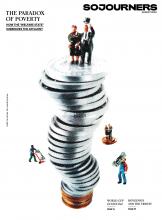
How the “welfare state” is designed to subsidize affluence rather than fight poverty.
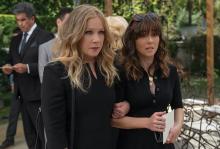
I AM CONVINCED that 20 years from now, Dead to Me will finally get the praise it’s due, ending up in some culture magazine’s ranking of the best TV comedies of all time. (I’m giving you a head start, Sojourners: Beat Rolling Stone to the punch.)
Dead to Me, a Netflix show about a woman and her children grieving her husband after he is killed in a hit-and-run, is sort of what you would get if you merged another destined TV classic from Netflix — Grace and Frankie — with the Joan Didion memoir The Year of Magical Thinking and then sprinkled in a police investigation. The show is laugh-so-hard-you-cry funny and yet is driven by situations that would probably make you weep if you paused to think.
I barely had time to do that, though, because Dead to Me is a twisty thriller centered around a hilarious opposites-attract friendship between the widowed protagonist Jen (Christina Applegate) and a jolly woman she meets at group grief therapy named Judy (Linda Cardellini). Throw in some great meditations on friendship, forgiveness, motherhood, absence, and why everything is so screwed up if the whole world is in God’s hands; a Christian youth dance troupe; and an astounding performance by the actor James Marsden, and you have one of the best TV shows ever.
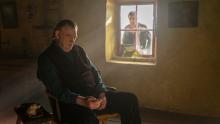
The Banshees of Inisherin has received several awards from the Golden Globes and multiple nominations for the forthcoming Academy Awards. It’s not hard to see why: Martin McDonagh’s film captures the complex, deep turmoil of a friendship falling apart. The friendship falls apart because the characters don’t have the framework to work through misunderstandings due to their depressive state.
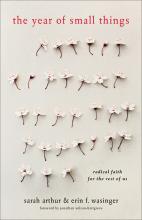
WHAT WOULD IT look like to extend radical hospitality to the “other,” spend less money in order to give more away, reclaim the Sabbath by practicing intentional rest, embrace simplicity by downsizing material possessions, and seek the renewal of ailing cities and neighborhoods by living in them rather than fleeing them—all while holding jobs and raising a flock of kids?
In The Year of Small Things, Sarah Arthur and Erin Wasinger set out to discover the answer. Inspired by the New Monasticism, a movement that integrates ancient Christian values into modern life, the two friends and their families embark on a year of small but intentional steps of faith and action, devoting each month to a different theme, whether prayer, sustainability, or serving the needs of the under-resourced city in which they live and worship.

No one cared to get to know the man that they were killing — in Jesus’ case, and in the case of my friend. The judges and governor had made up their mind on who he was based on media headlines. No one saw any need to sit with the man who was on the execution table, to find out if his life had changed and whether or not he was having a positive influence on those around him. They defined him by a crime he had committed years ago.

Rabbi Jonathan Sacks made a name for himself as chief rabbi of Great Britain for nearly a quarter-century, a time of great tumult that included the Sept. 11, 2001, attacks, the influx of millions of Muslims into Europe, and the ongoing pressures to absorb and assimilate newcomers into a mostly secular society.
As chief rabbi, from 1991 to 2013, he stressed an appreciation and respect of all faiths, with an emphasis on interfaith work that brings people together, while allowing each faith its own particularity.

Self-professed best friends, Anthony and Dustin have two very different energies. Anthony is compact, and speaks with vivid and pointed images that cut through the fog of misconception. His gaze is simultaneously direct and yet deeply reflective. Dustin emanates a good ol' southern boy vibe: easy grin, easy mannerisms, each movement relaxed and deliberate.
And then there is the one glaring difference between them: Anthony is black. Dustin is white.
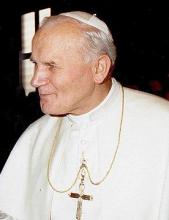
A series of letters sent from St. John Paul II to a Polish-American academic shed new light on the pair’s close relationship and intimate discussions. Details of the correspondence between the former pope and Anna-Teresa Tymieniecka, a Polish-born philosopher, were published by the BBC on Feb. 15. The duo’s friendship has been well documented, although newly released letters held at the Polish National Library show the closeness of their relationship.

IT IS A SAD truth that presidential election seasons widen our divisions. The candidates seem to view veering toward the extremes as a mark of “patriotism.” That ethic gets reflected in our broader political discourse.
This is dangerous stuff in a diverse democracy. The heart of the American idea is that different groups can advance divergent interests and still collectively see themselves as one people. Princeton philosopher Jeffrey Stout puts it this way: “[Democracy] takes for granted that reasonable people will differ in their conceptions of piety, in their grounds for hope, in their ultimate concerns, and in their speculations about salvation. Yet it holds that people who differ on such matters can still exchange reasons with one another intelligibly, cooperate in crafting political arrangements that promote justice and decency in their relations with one another, and do both of these things without compromising their integrity.”
He calls this process of relating across differences building a “civic nation.” In the pursuit of that high value, here is a personal story of building relationships across deep religious differences.
MY WIFE’S PARENTS are moderately observant Muslims. For many years, they lived in a Chicago suburb next to an evangelical Christian family who homeschooled their three girls. At first, the two families were pleasant to each other but had little contact. Things changed when, one year when my wife and I were visiting for Eid prayers, the girls next door poked their heads over the wooden fence and invited our boys to come over and play. Our boys whooped happily and went.
This of course meant all of us adults trooped across the driveway and properly introduced ourselves to the neighbors. We collectively overheard a fascinating interfaith conversation in the backyard, our oldest son Zayd explaining that he got out of school today to celebrate Eid, a holiday that Muslims believe in because we believe in the Prophet Muhammad and the Quran. The neighbor’s oldest daughter responded that they go to school at home so they can follow a Christian curriculum because they believe in Jesus and the Bible. We adults shifted uncomfortably as we listened, knowing full well the doctrinal issues at stake. “Looks like someone learned something in religion class this week,” somebody commented, allowing nervous laughter to break out.
A woman explores the recent trend of “death cafés” — public meetups among strangers to share experiences, memories, and challenges dealing with death of loved ones. “Death: What happens next?”
2. Has ‘Diversity’ Lost Its Meaning?
“When the word is proudly invoked in a corporate context, it acquires a certain sheen. It can give a person or institution moral credibility… It’s almost as if cheerfully and frequently uttering the word ‘diversity’ is the equivalent of doing the work of actually making it a reality.” Scorching indictment. Necessary read.
3. Persian Gulf May Soon Become Too Hot for Humans
A new study shows that by the end of the century, the heat index may hit 165 to 170 degrees for at least six hours each day. So about hosting World Cup 2022 in Qatar…
4. ‘Granny Pods’ Keep Elderly Close, at a Safe Distance
Okay, maybe we can find a better name. But these tiny houses that sit in your backyard and come with security and medical resources are a step towards improving end of life care, and keeping our families close.

Shortly after news broke last week of the tragic murders in Chattanooga, Tenn., Muslims across the country took to social media to issue their condemnations of the shooting, including Muslim communities in Nashville, New York, the Council on American-Islamic Relations, and the American Muslim Advisory Council .
Nevertheless, an all-too-predictable wave of Islamophobia followed. Republican presidential candidate Donald Trump denounced President Obama because the president did not call the shooting an act of “Islamic terrorism.” And evangelical leader Franklin Graham posted on Facebook that “We should stop all immigration of Muslims to the U.S. until this threat with Islam has been settled.”
But as Ken Chitwood reminds us in “A ‘Radical’ Response to Islamophobia,” (Sojourners, August 2015), Christians have an important role in ending anti-Muslim discrimination. Through the liberating power of Christ, writes Chitwood, “[w]e are no longer enslaved to cultural constructions of antipathy such as Islamophobia.”

BY THIS TIME in the church calendar, the liturgical highlights feel like they’ve slowed considerably. The excitement of Easter is gone, not to be replaced by another holy season until Advent. Pastors and parishioners, who all stayed away the week after Easter, hopefully have returned. The holy days seem to have drained away into the season of counting the weeks, depressingly named as “ordinary time.”
Ecclesially speaking, however, the holy days are amping up considerably at this point. Easter season hits a crescendo with these latter weeks. The ascension of Christ used to be marked as one of the greatest feast days of the year, up there with Easter, Christmas, and Pentecost. It signifies Christ’s rule over all things, hidden now, to be full-blown and publicly obvious to all in God’s good time. Christ himself insists that he must go away in order that the Advocate would come and, in John’s language, to enable us to do even “greater works” than Jesus ever did. Pentecost is a new outpouring of the triune God to empower the church to do those greater works. There is much here to be celebrated. A crescendo, not a tapering off.
These texts present a reign inaugurated with resurrection in which the poor eat and are satisfied. One built on friendship and common love. It suggests a God who likes getting born enough that God decided to go through the experience and told the rest of us we should go through it all over again. Is that bodily enough for you?

I am in over my heart on the LGBTQ situation within the church. As a Christian ethicist, life-long evangelical, and devoted Christ-follower, my heart aches to the point where it’s breaking. I have friends, students, and family who are gay or lesbian, and my faith in Christ would be worse off without them. Among other things, they witness faithfulness to God amidst exclusion and persecution.
Fortunately, I’m in a church where being in over your heart is a good thing. Now called the Evangelical Covenant Church, my denomination’s founders called themselves Mission Friends at the outset. We began as a renewal group in Sweden around the practices of reading Scripture and hospitality. We began out of a love for spiritual formation, and we countered the dominant culture by allowing all people to be readers of Scripture.
Scripture reading in rural Sweden developed as a subversive practice. Though they were few and poor, lowly and insignificant, our Covenant forebears enacted justice by crossing prohibitive lines of class, gender, and age. Three things sustained them: the Jesus of the word; a new spirit of freedom and joy; and the word of God and the sacraments. As a result, these faithful groups gained the capacity to hear God’s word through the hearts and minds of individuals who differed from one another.
This practice of diverse interpretation amongst lay people forged ahead through the strength of friendships. The name “Mission Friends” grew under the Psalm 119 banner, “I am a friend of all who fear thee,” and the people of the movement treasured friendship and unity in Christ above any doctrinal or confessional statements. They believed that friendship is not only the method of advancing the gospel — it is the heart of the gospel. Friendship reflects in the simplest terms the way that the Evangelical Covenant church does ecclesiology, or life together.

The letter arrived at work about two weeks after baseball’s opening day in 2003. It had a Zanesville, Ohio, postmark. A return address sticker mentioned a Mrs. Howard Richardson.
What‘s this about?
Inside was a handwritten note along with a neatly clipped copy of my Cincinnati Reds season preview story from the Zanesville Times Recorder. I didn’t have to read far to get the gist.
This Mrs. Howard Richardson — she wasn’t happy with me. Not at all.
In beautiful cursive — the kind of handwriting you don’t see anymore — she pointedly took me to task for suggesting the Reds could be awful that season. I should be more positive, she insisted. It would help the players.
“You get more flies with honey than vinegar!!!!!” she wrote. (Yes, underlined and topped off with many exclamation points.)
The note was signed: Evelyn Richardson.

Henri Nouwen was a priest who taught at Harvard, Yale, and Notre Dame. He also was a talented and popular writer. Over time, he became dissatisfied in his role as a professor. He got an unexpected invitation to become chaplain for a community of people with intellectual disabilities in Toronto. He accepted and soon had misgivings.
Henri quickly realized that the people under his care couldn’t care less about what he’d written or how much he‘d learned. They weren’t capable of reading and understanding his beautiful words.
Henri was going to have to change. He would have to start living those words in a deeper way. And that’s hard. (I know full well that it’s much easier to write about things in a flowing way than it is to let those words flow through me in how I live every day.)
He had an experience that drove home the point.
In his book Life of the Beloved, Henri tells of a woman named Janet who lived in the community and was having a difficult time. So she asked Henri for a blessing. He responded in a rote way, putting his thumb to her forehead to make a sign of the cross — something he’d done countless times in his role as a priest.
Janet would have none of it.
“No, that doesn’t work,” she protested. “I want a real blessing!”

We met over email in the spring of 2012. I had just co-launched a literary blog and our mutual friend introduced us as fellow writers. Stephanie and I immediately hit it off. Not only was she a gifted writer, Stephanie and I shared a similar sense of humor and sensibility. As we got to know each other and began to write with each other, we discovered a ridiculous number of similarities and common points of interest, including and especially, our shared Christian faith. To paraphrase C.S. Lewis, it was as though every other email was a “you too?” moment.
Then one day I wrote a piece that indicated my progressive political leaning. The 2012 presidential election was heating up and though the piece was not overtly political, it revealed my beliefs. Stephanie, it turned out, was a conservative.
This news wasn’t really a big deal to me — I am used to have friends and family who have different political beliefs, and I even got my first start in the blogging world as the token “progressive” Christian through a conservative friend’s blog. But things were getting heated with the election and we didn’t know each other that well.
Stephanie and I began to email back and forth about politics through the lens of faith, which tested whether we were Christians or ideologues first. We shared two things in common in holding our different political beliefs because: 1) we had both thought a lot about them, and, 2) shockingly, neither of us had an interest in destroying America. Eventually Stephanie and I decided to co-write a bipartisan series for our website, looking at partisanship through the lens of faith (summary: love for Jesus makes for fertile common ground).
After the election it was hard to ignore the mix of apocalyptic expressions of woe and the tone-deaf exclamations of victory. Each came with its own vilification of the other party. I found myself at parties with fellow progressives defending conservatives because the caricatures of them were plainly wrong, and I would be hurt if Stephanie didn’t defend me against caricatures of progressives.

Do you have a favorite superhero? I’ve always liked Batman. As a boy, I read all the Batman comic books. I like the cape and the cowl, the bat logo, the cool car with the flames coming out the back, the interesting villains.
What I like especially is that Batman is a regular person. Other superheroes fly or run at supersonic speeds or stretch their body parts in ways that are very strange and make you wonder. Batman has none of those powers. He’s like us — well, regular except for the part about being ultra-rich and living in a mansion above a bat cave …
The bottom line is that Batman fights for a better world using the things available to all of us: Creativity. Commitment. Courage. A passion to make a difference someone else’s life.
He reminds me of the super hero in each of us.

Overheard on a Facebook conversation last week: “There is really not much difference between compassion and pity when it comes to being on the receiving end of it.” This thought gave me pause as I consider compassion to be a central tenet of biblical justice, and yet, I experience this to be true. We use the fancy spiritual term of “compassion” when the gist of the sentiment is, indeed, pity.
The above conversation rose out of a discussion on the viral story of Pope Francis kissing the disfigured man. The media reporting the story highlights the compassion of the Pope, how his actions are pushing outside the box of the papacy, and how revolutionary his love was. Other than a brief medical description of the disfigured man’s disease, there is no additional information on who he is, where he lives, or whether he has a family. We are not even given his name. The buzz generated by this story arises out of an awed respect for someone who could even consider touching such a pitiful, nameless person. I can’t help but wonder how this man feels to have the world captivated by somebody showing love to himself. It seems to me his deformity has been made into a public spectacle.